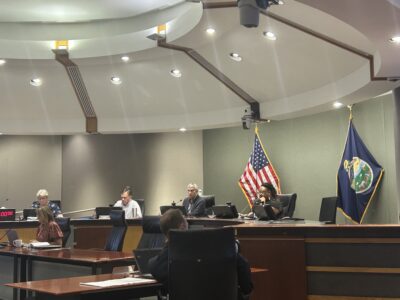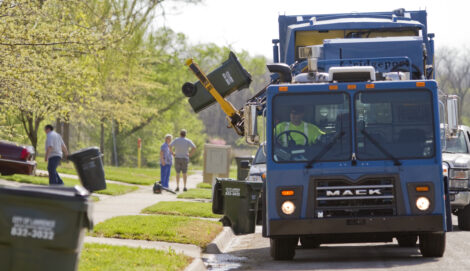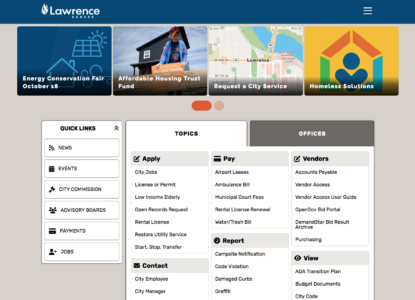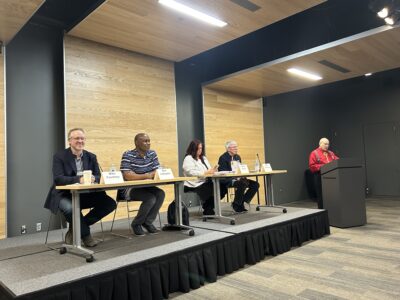Lawrence Commissioners approve funding second phase of city’s $130 million MSO campus as leaders call it a ‘true investment’

photo by: Bremen Keasey
Lawrence City Commissioners hearing a presentation updating the progress of the Municipal Services and Operations campus during the Tuesday night meeting. Commissioners voted 4-0, with Commissioner Bart Littlejohn absent, to approve a about $57 million funding agreement for construction of the second phase of the campus.
Lawrence city commissioners on Tuesday night approved funding the second phase of construction for the city’s new $130 million Municipal Services and Operations campus.
Commissioners voted 4-0 to award a contract to the construction firm McCownGordon for just over $57 million of work on the second phase of the MSO campus. Commissioner Bart Littlejohn was absent.
As the Journal-World reported, the commission voted in April 2024 to approve an accelerated timeline for constructing the campus. The $130 million project will bring together various city divisions, including streets, water, sewer, inspections and traffic, and will also have space for MSO administration, a fueling station and a central maintenance garage.
The first phase of construction on the campus, located at VenturePark in eastern Lawrence, has been ongoing since December, with the city allocating about $64.5 million for that portion of the project. The second phase will house the Solid Waste division and Central Maintenance Garage building. Funding for the project is included in the city’s capital improvement plan, and has been factored into the city’s property tax rate.
Melissa Sieben, the MSO director, told commissioners this was a “last critical component” for the new campus. She noted most of the current facilities were built in the 1980s when the city’s population was around 50,000, which has since doubled. Additionally, since many of the current facilities are built in a flood plain, they can’t be expanded or adjusted.
Dan Maginn, a principal architect with architecture firm Dake Wells, which helped design the campus, said the current facility can create hazardous conditions for MSO workers. Maginn said there currently are not enough service bays at the facility, and workers are serving vehicles in cramped spaces or occasionally serving vehicles “outside in the elements.”
The new maintenance garage will add a new operational floor that is 74,950 square feet, while the current garage is at 11,670 square feet, according to Maginn. That expansion will mean it can service more vehicles, helping the city have more of its fleet available and leading to efficiency. Maginn also told commissioners that Solid Waste trucks have the biggest service needs, so it made sense to consolidate them together.
During public comment, a handful of MSO employees asked commissioners to approve the agreement to fund the second phase of the campus. A couple said it would improve the safety for the employees because they are currently working “shoulder to shoulder.” Another commenter noted that right now, the Solid Waste division works out of two buildings separated by two miles, and both have “outdated infrastructure” that lead to a “lack of efficiency.”
With the approval of the agreement, the city will spend a total of $130 million for the MSO campus, and one public commenter said they are concerned on how the price tag will impact the city’s debt.
Vice Mayor Brad Finkeldei said that while the project is pricey, he felt it was important to get the campus built in just two phases– he noted early plans suggested work on the campus might run past 2029 — because MSO has “needs all over the place.” He acknowledged it is expensive, but it was something the city had to do.
“(This) infrastructure is expensive but this will be great for the community in the long run,” Finkeldei said.
Commissioner Amber Sellers said she “couldn’t be more excited” to approve the final stage of the project. She said she saw this campus as a “true investment” for the city’s employees, and she is happy with this agreement.
Construction for the second phase of the campus could begin in March 2026, with the city hoping it would be complete in November 2027.
The first phase of the campus, which will house the majority of the MSO department’s divisions and the fueling station, is expected to be completed in spring 2026.
In other business, commissioners…
Approved a request for financial incentives from US Engineering for constructing a new 75,000-square-foot-facility in Lawrence VenturePark.
The commission approved an incentive package with a 4-0 vote that awarded two lots to the firm, a 70% abatement on property taxes for the next 10 years and a sales tax exemption for construction materials needed to build the new facility. Those terms come from the city’s Catalyst Program, which the city created in 2017 as a way to attract businesses to its business parks.
As the Journal-World reported, the Kansas City-based firm filed those plans to expand with City Hall in August. US Engineering already operates a 150,000-square-foot production center that employs around 150 pipefitters and sheet metal workers. The first facility opened in 2022.
Tyler Nottberg, the CEO of US Engineering, said during the meeting he was thankful of the partnership with the city over the past few years and said it “made a whole lot of sense” to continue investing in Lawrence.
Brandon Wikoff, the president of US Engineering, told commissioners the firm anticipates adding 30 jobs in its first year of operation and eventually plans to have around 50 total employees at the new facility. He also noted the first facility “grossly exceeded expectations” in the total headcount and pay of the facility, noting in 2025, the actual headcount of the plant is 162 employees with an average age of $112,324, besting pay estimates of about $90,000 per year.
Dever said he appreciated the company’s investment in the city of Lawrence and was happy to see the “substantial impact” to the community it has brought through the jobs and high wages.
A city memo said US Engineering wanted to begin construction on the new facility — anticipated to cost $12 million — later this year, with hopes it will be finished by July 2026.
• Voted on two items to set increased rates for the stormwater and solid waste utilities.
Commissioners approved two items that set the stormwater rate for 2026 and the solid waste rates from 2026 to 2028. Both those items were approved by a 4-0 vote.
The stormwater rate is calculated per Equivalent Residential Unit. Trevor Flynn, an Assistant Director with MSO, said the new ordinance would modify the size of an ERU from 2,366 square feet to 2,800 square feet of impervious surface. Flynn noted that change came as a result of a recent survey of all single-family residential parcels and will now reflect the median size of those units.
For 2026, the recommended rate will be $10.71 per month, which reflects a 6% increase in the rate per square foot from the 2025 rate. Flynn noted about 24% of single-family residential costs would decrease, about 38% of payers would see no change in their total costs and 38% of users would see their bills increase.
The proposed solid waste rates would increase by 5.5% each year from 2026 to 2028 for residential users. Last year, residential rates were raised by 4% from 2024 to 2025. Mike Lawless, the deputy director for MSO, told commissioners residential rates would be raised by $1.25 in 2026, $1.32 in 2027 and $1.40 in 2028.
Commercial rates would be increased between 3% to 9.5% under the proposal. Because the cost varies by container size, there is no specific dollar amount for most of the units. However, the rate for commercial carts would be raised by 3% each year, making the rates $1.02 in 2026, $1.05 in 2027 and $1.09 in 2028.
• Authorized a nearly $4.8 million construction contract to begin the renovation to the city’s Outdoor Aquatic Center.
Commissioners approved a contract of just under $4.8 million with Royal Construction Services LLC to renovate the outdoor pool at 727 Kentucky St. The item was approved as part of the city’s consent agenda, which is considered under one vote.
The construction will be done over two phases, as the Journal-World reported. The first phase, which is expected to start later this year, will focus on improving the restrooms and other structures at the pool, while phase two will focus on the aquatic area itself.
The first phase is expected to be completed in May 2026, while the second phase of construction is expected to finish before summer 2027.
As the Journal-World previously reported, the renovation timeline — and plans — for the pool have changed in the past year. The pool was originally expected to have its renovation completed in summer 2026, but in August, the city announced that construction would not start until later this year, in part due to a stormwater project underway that includes construction adjacent to the pool.
Additionally, the initial redesign approved in summer 2024 would have added in a variety of new aquatic features, but shrunk the total space of the pool. Commissioners eventually approved the current concept in November 2024 after public pushback to the previous design.






